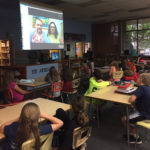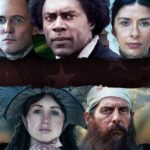The 150th anniversary of the District of Columbia Compensated Emancipation Act of 1862
occurred in 2012. This bill was introduced to Congress to end slavery in the District of
Columbia. Many citizens and members of Congress alike noted that the legality of slavery in
the District of Columbia was inconsistent with the ideals and aspirations of the nation. Congress
approved the bill, and President Abraham Lincoln signed the act.
This activity features the District of Columbia Compensated Emancipation Act of 1862 and
other primary and secondary sources that tell the story of Congress’s role in this first major step
toward the freeing of enslaved African Americans. While intended for 8th grade students, the
lesson can be adapted for other grade levels.
The Rule of Law and Public Health: A Socratic Seminar
For this high school Socratic Seminar, students will be asked to examine various readings and videos on public health and the rule of law and then explore the question “What role does the law play in protecting our health?” Encourage students to be prepared, participate actively, use evidence, listen carefully, and ask thoughtful questions of their peers throughout the seminar. There are resources to explore several public health examples (e.g., clean water, coal dust, COVID-19) included in this seminar guide, so feel free to select one or more, and adapt to your needs.
The Twenty-fifth Amendment
This eLesson will provide students with an opportunity to learn about the text of the Twenty-Fifth Amendment as well as its historical usage and potential need. It will ask them to consider why such an Amendment was deemed necessary and how it has been, and could be, used. It will also give students the opportunity to debate possible applications of the Twenty-Fifth Amendment
Voting by Mail
Because of concerns over COVID-19, many states may ask people to vote by mail this year. Are your students ready to vote on Election Day 2020? Let students see what a mail-in ballot process is like, and discover the advantages and disadvantages of mail-in elections.
Free Press and SCOTUS: Incorporating Case Studies in the Classroom
This lesson will ask students to engage with landmark freedom of press case studies exploring how the Supreme Court has ruled on First Amendment issues and has tried to balance competing values in our democracy.
Virtual Field Trips at Monticello

Monticello has partnered with Microsoft Skype in the classroom to bring FREE virtual field trips to your students, grades K-12. The virtual field trip lasts about 45 minutes, during which time a Monticello educator will talk to your class about Monticello using images, props, and an online virtual tour. Your students can ask the educator questions, and you can prepare your students with pre- and post-visit resources.
Why Government? (Lesson Plan)
Students take a look at two political thinkers that spent a lot of time trying to answer the question, “Why Government?” – Thomas Hobbes and John Locke. This lesson combines our Influence Library entries on these men and adds activities that ask students to compare and contrast Hobbes and Locke and to think about how these philosophers influenced those that followed in their footsteps. This lesson is one in a series entitled “Foundations of Government.”
Cast Your Vote (Game)
What issues do you want to ask candidates about? In Cast Your Vote, you choose the questions in a debate, rate their responses, and vote for the candidate of your choice.
Created Equal

The Created Equal project uses the power of documentary films to teach about the changing meanings of freedom and equality in America. The five films that are part of this project – “The Abolitionists,” “Slavery By Another Name,” “Freedom Riders”, “Freedom Summer” and “The Loving Story” – tell the remarkable stories of individuals who challenged the social and legal status quo, from slavery to segregation.
Running Toward Danger Video Lesson
This video tells the story of Sept. 11, 2001, in New York City through primary source interviews and news footage. Ask your students to explain the role of journalists in covering catastrophes.